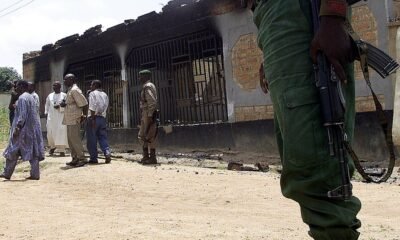Opinion
The Impact Of Covid-19 On The Nigerian Newsroom (1)

BY OLUFUNMILAYO HABIBAT OBADOFIN
Over 160 days after the first case of the Covid-19 virus was reported, its outbreak has evidently propelled a huge disruption in individual routine and given rise to a global economic downtime. A popular feature of the economic downtime is the loss of jobs and pay cuts across various industries including aviation, health, finance, agro-allied as well as the Nigerian media industry.
The impact of the pandemic has been enormous, to the point that it has altered the temperature of the average newsroom; it has caused media outlets in the country to experience a significant drop in revenue, as a result of a drop in sales and advertisement.
A reporter that was interviewed shared that for her organization, there has been a challenge in getting advertisements and in running other special projects to raise funds for financing the organization.
As of the time of the interview with her (June, 12), only a percentage of February salary has been paid. She added that the non-editorial staff is usually given preference with the payment of salary, as it is believed that editorial staff are more likely to get tips from clients than the non-editorial staff.
Impact 2
Before Covid-19 outbreak, Nigeria had recorded a yearly increase in its unemployment rate, and the situation has further deteriorated with the pandemic.
According to a survey conducted by the Nigeria Bureau of Statistics and the World bank, more Nigerians in the lowest consumption quantiles have lost their jobs between April and May. Equally, there has been an income loss especially for non-farm businesses.
On May 29, some staff of the Punch Newspaper closed work with the sad news of either a termination of employment or a slash in salary. For those who could read between the lines, this has come as no surprise because before then, the newspaper outlet had reduced the pages of its newspaper from 48 to 32 pages, the reason hinged on a rapid drop in readership due to the lockdown. In addition and according to a publication by nairametrics the Managing Director, Ademola Osinubi had prevised the staff of the new development in a memo released earlier.
“This pandemic has dealt with our business telling and severe blows. Our circulation and advertisement revenues dipped dangerously, compounding the operational and revenue challenges birthed by the migration of a majority of print newspaper readers and adverts to digital platforms.
“I am not at liberty to disclose all of the measures that the management has taken so far. But the ones that could be made public include an immediate reduction in print pagination; staff furloughing to comply with government and expert advisories on social distancing; the temporary shutdown of the sports newspaper; and significant financial reengineering”.
Impact 3

“All projections point at a bleak and uncertain future for the media industry and the economy.”
This reality is also shared by other notable media houses in the country. According to a report by Nairametrics, the Nation newspaper has sacked 100 out of its about 500 workers across the nation. Other media outlets affected include the news-telegraph, Daily Independence newspaper, AIM group (owners of Nigeria Info., Cool FM, Wazobia, and Arewa) and even entertainment outlets such as Iroko TV. Beyond the loss of jobs and slash in pay; furlough and closure of media outlets are also dangers recently permeating the media industry.
The Chairman of Nigeria Union of Journalist (NUJ) Lagos State Chapter Dr. Akinreti in an interview confirmed that the media being a service industry is badly affected by the pandemic, and there has been a drastic fall in income for journalists and newsrooms. He added that only state-owned outlets are not as affected due to the provision of the state’s subvention.
According to him, some organizations have resorted to salary cut for employees ( as low as 20-40% of actual salary) and/or sending staff on a three months compulsory leave. Going further, he made it known that organizations who have taken these measures are equally not happy with the decisions, but the present financial crisis has necessitated such actions.
However, negotiations are ongoing to develop a mutual fair plan between organizations and employees. He said, “this is important as the financial downtimes are beginning to affect the morale of journalists”.
Impact 4
The narrative is not different in the global space, on May 27, BBC News, reported the UK Financial times print sales falling by 39% in April, though advertising has not. Also, ITV’s advertising revenue fell by 42% in April, and FOX in the US dropped by 50%. A survey by the Network times reports that close to 36,000 media workers have been laid off, furloughed or had pay reduced.
Journalists, locally and globally, have played very active roles in updating the public on measures, best practices and other information to containing the spread of the Corona Virus.
In addition, the Nigerian Journalists also go through the sacrosanct responsibility of updating the citizens with variants of news stories on government activities, security issues, finances, politics, and election updates, etc. For this purpose, frequent movement around the cities, and towns, has been inevitable, and consequently, they are exposed to the risk of contracting the virus.
During the period of total lockdown, journalists were among essential workers authorized for movement to ease the execution of their jobs, which impact cannot be undermined in the fight against the pandemic. Even with this privilege, journalists have reported cases of harassment by Security Men in carrying out their constitutional duties.
For instance, on May 19, a number of journalists along with other essential workers were reported to have been arrested by some of the Nigerian policemen in Lagos state.
The claim around harassment of journalists was consolidated by the Lagos state Chairman, Nigeria Union of Journalist, Dr. Akinreti. He said what ought to be a relationship of partners in progress has become a cat and mouse game. In his words, he said, “it’s unfortunate that security officers look at journalists as enemies”.
He made a plea that security officers should begin to accord the press the respect they deserve and support them in the course of their work.
A journalist, from Daily Independence also complained that she had been impeded in the course of her work.
READ ALSO: Youth leader Cancels Annual Colloquium Over COVID-19
She recounted one of her experiences during an official assignment “I was on a despatch bike but on getting to Apagbon, Lagos Island bridge, the driver (a despatch rider from another newspaper house I met at my bus stop) was forcefully stopped and the police refused us access despite tendering our identity cards. I had to find my way down to my assignment venue at CMS”
Impact 5
On October 14, 2019, Amnesty International released a report describing and condemning the treatment of Journalists by the Nigerian Authority. Some of the issues identified include charges of defamation for exposing corruption, on-air personality harassment, the accusation of journalists for cybercrime, stigmatization for investigative journalism, arrest for social media posts amongst others.
Similarly in 2016, the Nigeria Bureau of Statistics in a report informe that over four thousand (4000) journalists along some trade unionist and human rights advocates were either killed, kidnapped, tortured or arbitrarily detained just within a year
-To be cont’d



























